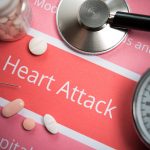 A heart attack is not an inevitable part of getting older. In fact, it is quite preventable without the use of medications. Lifestyle changes and other natural remedies can work wonders in reducing the risk of a heart attack.
A heart attack is not an inevitable part of getting older. In fact, it is quite preventable without the use of medications. Lifestyle changes and other natural remedies can work wonders in reducing the risk of a heart attack.
A heart attack takes place when blood flow to the heart gets blocked, which can result from the buildup of cholesterol or other substances forming plaques along the arteries and causing them to become stiff and narrow. When blood flow is disrupted, parts of the heart get damaged.
Advertisement
If not caught early on, a heart attack can be fatal, but with the advancements in treatment, people who have experienced a heart attack can go on living healthy lives. The moment you think you are experiencing a heart attack, you should call 911 immediately to receive help as soon as possible.
Lifestyle changes to prevent heart attack in elderly
Stop smoking: Not only does smoking increase your risk of a heart attack, but it can hinder your recovery, too. Although smoking cessation may be difficult, it’s important that you quit, no matter how many years you’ve been smoking for.
Watch what you’re eating: A healthy diet can go a long way in promoting heart health. Eating fruits and vegetables, whole grains, lean proteins, limiting saturated and trans fats, and eliminating processed foods can provide your body with essential nutrients it needs in order to keep your heart healthy. Not only that, but a healthy diet can also help control many risk factors that contribute to a heart attack, helping to maintain a healthy weight, reducing LDL cholesterol, and even managing your diabetes or blood pressure.
Manage cholesterol: Reducing your LDL cholesterol is an important step in heart attack prevention, because this type of cholesterol is what forms plaques along the arteries, causing them to become stiff and narrow. When this occurs, blood flow gets reduced, contributing to a heart attack. Ensuring your cholesterol is in check can help keep your heart healthy and save it from damage.
Lower high blood pressure: Blood pressure is the amount of pressure exerted against the artery walls. High blood pressure signals that your heart is working too much. An overworked heart becomes weak over time, which is conducive of damage. This damage can lead to a heart attack. Many lifestyle changes that work to prevent a heart attack can also work to control healthy blood pressure levels. Reduce salt from your diet, exercise regularly, and, of course, don’t smoke.
Exercise regularly: Regular exercise keeps your heart strong, helps you maintain a healthy weight, reduces blood pressure, and lowers cholesterol. It only takes a few sessions a week doing anything active really, from brisk walking to more vigorous activities. The key is to maintain consistency. Numerous studies have shown the detrimental effects of living a sedentary lifestyle, including early death. Therefore, it is highly important that you move as much as possible.
Maintain a healthy weight: Being overweight or obese had been tied to various health problems, from diabetes to heart issues. Following these lifestyle tips can help maintain a healthy weight, too.
Manage diabetes: Diabetes is a known risk factor for cardiovascular disease and heart attack. Type 2 diabetes is a result of unhealthy lifestyle choices. Unmanaged blood sugar can lead to complications, from nerve damage to even vision problems. Following these healthy lifestyle tips can help you better manage your diabetes all the while preventing a heart attack.
Reduce stress: Numerous studies have shown a link between heart disease and stress. When we are stressed, cortisol is released. In the short term, this is a natural “fight or flight” response to help the body get out of dangerous situations. In the long term, excessive levels of this hormone can have detrimental effects on the heart and bodily functions. Finding healthy ways to minimize and reduce stress can help promote a healthy heart.
Limit alcohol: Although some studies have shown the benefits of moderate alcohol consumption, many more point to the fact that it is harmful to the heart. Drinking too much alcohol has been linked to higher blood pressure, heart attack, cancer, and stroke, among other diseases. If you do drink, limit your daily consumption to two glasses for men and one glass for women, but for some people, even drinking the allowed dosage every day can be too much. Also, if you are going to choose an alcoholic beverage, stick with red wine, as that has been shown to offer some benefits.
Heart attack prompt treatment to prevent heart damage and mortality
 The moment you believe you are experiencing a heart attack, you should seek out treatment immediately. Here are early signs of a heart attack:
The moment you believe you are experiencing a heart attack, you should seek out treatment immediately. Here are early signs of a heart attack:
Heart attack sign #1: Chest pain
This is the most common sign of a heart attack that men report. Often, the chest discomfort is described as a pressure, tightness, or heaviness. The discomfort usually begins in the center of the chest and can radiate to other areas of the body. Additionally, the chest pain may come and go, or it may be continuous. If you are experiencing chest pain, especially if it persists, call 911 immediately. You may be having a heart attack, and the sooner you receive treatment, the better your chance of survival.
Heart attack sign #2: Upper body discomfort
While the most common sign of a heart attack is chest pain, it does not always start there. Sometimes, a person having a heart attack may complain of pain in one or both arms, the neck, jaw, or even the stomach. Women that are having a heart attack are more likely to experience pain in the jaw or back, compared to men. These signs may signal a heart attack or another health problem. It is important to call 911 if these symptoms come on suddenly, or if they are seen with another sign of a heart attack.
Heart attack sign #3: Difficulty breathing (shortness of breath)
If you are short of breath when you aren’t exerting yourself, this is a red flag. Sit or lie down, and see if the symptoms dissipate. If the shortness of breath lasts longer than two minutes, call 911.
Heart attack sign #4: Nausea, sweating, clamminess
Advertisement
These signs of a heart attack are much more subtle and are reported more in women. If these symptoms appear suddenly or are seen with another warning sign of a heart attack, call 911.
Heart attack sign #5: Extreme fatigue (tiredness)
Like nausea, sweating, and clamminess, this is another subtle sign that you could be having a heart attack. While you may be experiencing this sign as a result of another health problem, if it appears suddenly or with another symptom, call 911.
Depending on the severity of the heart attack, you can be treated with medications or surgery. If you currently have unhealthy lifestyle habits, it is even more important that you make these changes in order to successfully recover from the heart attack and prevent your risk of experiencing another.
